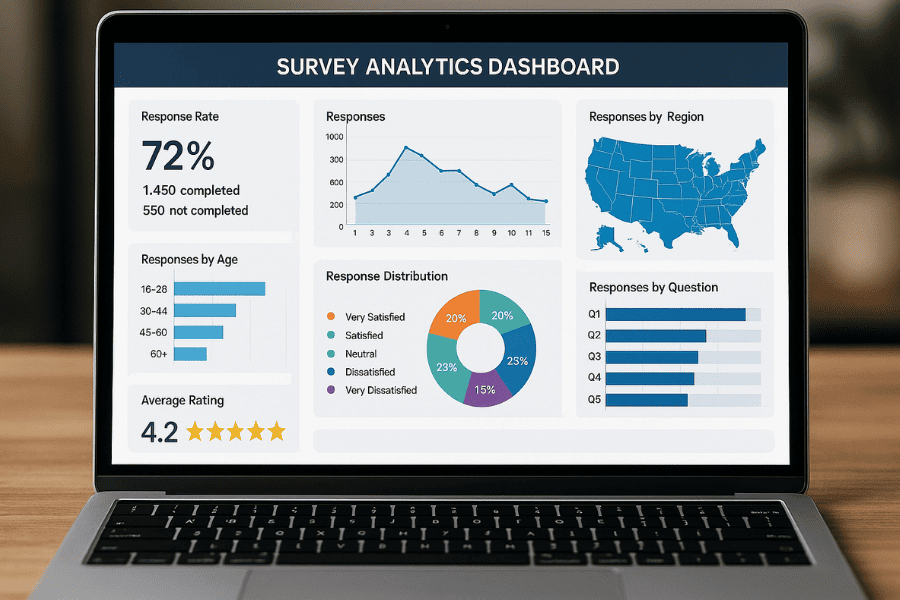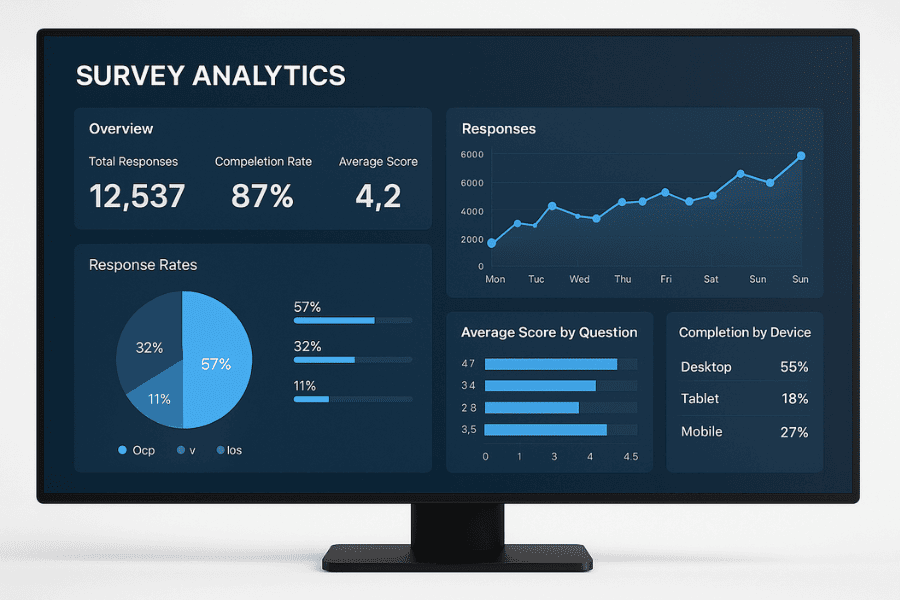Buzzfeed-Style Surveys: Can Fun Quizzes Teach Us About Research?
Explore how Buzzfeed-style surveys relate to real research, uncovering what we can learn from fun quizzes in the digital age.

Introduction
We've all taken one. Whether it was finding out which type of bread you are or what your spirit animal says about your personality, Buzzfeed-style surveys have become a ubiquitous form of entertainment. But behind the light-hearted fun lies a compelling question: Can these kinds of quizzes actually teach us anything about real research? It's easy to dismiss them as trivial, yet they touch on many of the psychological mechanisms used in more formal social science studies.
For a step-by-step guide on creating effective surveys, check out How To Create An Online Survey: 7 Proven Steps for Success.
What Are Buzzfeed-Style Surveys?
Buzzfeed-style surveys are typically short, playful quizzes often found online. They focus on themes like personality, pop culture, relationships, or lifestyle. The results are usually instant, entertaining, and framed in ways that feel relatable or shareable.
The Psychology Behind Quizzes
At their core, these quizzes rely on psychological principles such as pattern recognition, categorization, and affirmation bias. People like seeing themselves reflected back in a positive light, and quizzes cater to this desire.
- They leverage our need for identity and belonging.
- They offer quick feedback with low commitment.
- They use simple language to ensure accessibility.
For creative ways to use surveys beyond customer feedback, explore 10 Creative Ways to Use Online Surveys Beyond Customer Feedback.
Why Are They So Addictive?
The viral nature of Buzzfeed-style quizzes stems from their design. They're fun, fast, and often humorous. But more importantly, they activate the dopamine reward system, just like games and social media.
Data Collection Wrapped in Entertainment
Every time a user completes a quiz, they generate data. This includes answers, patterns, and sometimes even location or demographic data. Companies can use this for:
- Audience segmentation
- Ad targeting
- Product recommendations
Comparing Buzzfeed Quizzes and Academic Surveys
Despite differences, both formats aim to uncover patterns, albeit at different levels of rigor.
Potential for Educational Use
Educational institutions have begun exploring gamified learning. Buzzfeed-style surveys could serve as introductory tools to more complex topics. For example, a fun quiz about world capitals might be a gateway to deeper geographic study.
Can Fun Quizzes Spark Genuine Self-Reflection?
Surprisingly, yes. While not as nuanced as psychological inventories like the Big Five, these quizzes can spark introspection. People often discuss their results with friends, which leads to conversations about values and identity.
Ethical Concerns and Data Privacy
When users engage with Buzzfeed-style quizzes, they rarely consider the data they give away. Without clear privacy policies, there's a risk of misuse, especially when quizzes are embedded on third-party platforms.
The Fine Line Between Entertainment and Manipulation
Quizzes can shape opinions subtly. For instance, a quiz titled “What Kind of Voter Are You?” might include leading questions that frame political issues in a specific light.
The Role of Confirmation Bias
People often gravitate toward results that affirm what they already believe about themselves. This cognitive bias limits the objectivity of the insights these quizzes might offer.
Can Quizzes Predict Behavior?
Not reliably. While they might hint at tendencies, they lack the controls, repeatability, and robustness needed for behavior prediction in academic terms.
Buzzfeed Quizzes and Market Research
Marketers love quizzes because they increase engagement while collecting data. For example, a “Which Product Is Right for You?” quiz can drive personalized e-commerce experiences.
The Gamification of Research
Buzzfeed-style surveys are part of a broader trend toward gamification. Apps like Duolingo and platforms like Kahoot! show that game-like elements increase user engagement and retention.
Designing Better Quizzes
With the right design principles, these quizzes can be more than fluff. Elements like clear objectives, unbiased questions, and accurate feedback can make them valuable tools in research or learning.
Real Research Inspired by Pop Culture
Sometimes, quirky surveys inspire academic studies. For instance, psychologists have analyzed the popularity of astrology-based quizzes to explore belief systems and pattern recognition in cognition.
Limitations of Self-Report Tools
All surveys, academic or informal, rely on self-reporting, which is prone to biases. Buzzfeed quizzes are especially vulnerable due to their playful tone and non-anonymity.
The Social Sharing Factor
Much of a quiz’s popularity comes from its shareability. When users post their results, it drives more traffic and more data. This viral loop is both a feature and a challenge for credibility.
Can Buzzfeed-Style Surveys Inspire Citizen Science?
Absolutely. If structured well, these quizzes can crowdsource large-scale data, especially in fields like linguistics, opinion polling, or even epidemiology.
Lessons from Clickbait Titles
Titles like “Only True ’90s Kids Can Pass This Quiz” tap into nostalgia and ego. These same principles are used in real research to encourage participation in studies.
The Role of Humor in Engagement
Laughter is a powerful engagement tool. When quizzes are funny, they break down resistance and make participation enjoyable, traits that academic research could emulate more often.
From Passive Users to Active Participants
Buzzfeed quizzes, though simple, engage users. In real research, increasing participation rates remains a major challenge. Could the fun factor be part of the solution?
Bridging the Gap Between Fun and Fact
The key lies in hybrid models. By merging entertaining formats with scientifically valid questions, we can create tools that are both engaging and informative.
Conclusion
Buzzfeed-style surveys may not stand up to scientific scrutiny, but they do tap into real psychological principles and behavioral tendencies. Used wisely, they can bridge the gap between casual curiosity and genuine insight. Whether for educational purposes, marketing, or even preliminary research, these quizzes prove that fun and fact don't always have to be at odds. They just need better framing.
Frequently Asked Questions
Find answers to the most common questions about this topic
Most Buzzfeed quizzes are not scientifically validated, but they can reveal general patterns and public opinions.
Only if they follow proper methodologies like random sampling, control groups, and validated questions.
They’re engaging, easy to complete, and offer quick gratification with personalized results.
In some cases, people may reflect on their personality or behavior after taking a quiz, but lasting impact is rare.
Yes, especially when used to segment audiences or understand consumer interests at scale.
Yes, if designed carefully, these quizzes can serve as a gateway to deeper learning or self-discovery.

Author
Bruma






